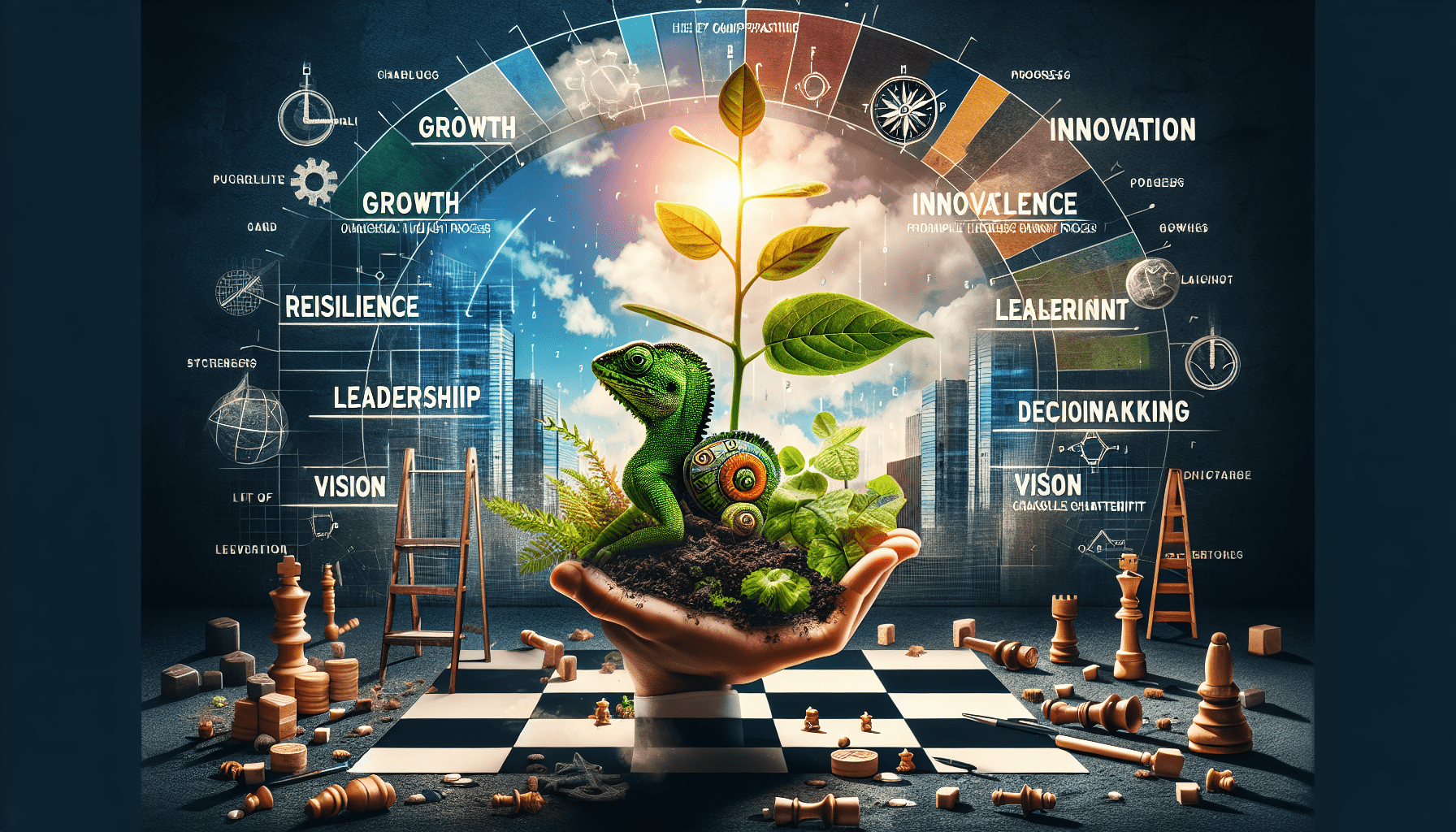Do you ever find yourself marveling at the sheer genius and resilience of entrepreneurs like Steve Jobs, Mark Cuban, and Bill Gates, wondering if you have what it takes to join their ranks? It turns out, the path to entrepreneurial success isn’t reserved for those with a particular set of inborn traits. Instead, it’s paved with a collection of key characteristics that anyone can develop. From harnessing the tenacity to push through challenges, igniting passion for your product or service, to welcoming ambiguity and risk with open arms, these traits form the backbone of a successful venture. Add to that the vision to spot untapped opportunities, unwavering self-confidence, the flexibility to adapt, and occasionally breaking the rules, and you’re on your way. If you’re curious about whether these seven traits are nestled within you, ready to catapult you into entrepreneurial success, let’s embark on this enlightening journey together and discover what sets successful entrepreneurs apart.
Tenacity
Definition and importance of tenacity in entrepreneurship
When you’re diving headfirst into the world of entrepreneurship, tenacity is your best friend. Think of it as your ability to stick to your guns, come what may. It’s that unwavering determination that keeps you pushing through the countless challenges and setbacks you’ll undoubtedly face. In the entrepreneurial landscape, where uncertainty is the only certain thing, being tenacious is not just important—it’s crucial. This kind of perseverance is what separates the fleeting ideas from businesses that stand the test of time.
Living with uncertainty and overcoming obstacles
Embracing uncertainty isn’t just part of the game; it’s the entire playing field. You know as well as I do that the path of entrepreneurship is paved with “What ifs” and “Now whats.” Overcoming obstacles becomes second nature when you’re fueled by tenacity. It’s about facing those challenges head-on and finding ways to navigate through or around them, rather than folding the minute things get tough.
Learning from failure and the mantra ‘Fail fast, my friend’
You’ve probably heard the saying, “Fail fast, my friend,” more times than you can count. But it’s one of those cliches that holds a truckload of truth. Each failure is nothing but a stepping stone to success, a lesson in disguise. If you’re not failing, you’re probably not trying hard enough or taking enough risks. The key is to learn from these setbacks quickly, adapt, and move on. After all, time doesn’t wait for anyone.
Passion
How passion differs from the drive for monetary gain
Let’s get one thing straight: wanting to make a boatload of money isn’t going to be enough to sustain you through the rollercoaster ride of entrepreneurship. The real fuel here is passion. It’s about finding something that lights a fire in your belly, something you believe in so wholeheartedly that the prospect of bringing it to life and sharing it with the world keeps you up at night with excitement, not stress.
Passion for product or service over financial rewards
Trust me when I say, if you’re passionate about your product or service, it shows. It’s this genuine enthusiasm and belief in what you’re offering that attracts customers, not the price tag. Your passion is what will see you through those inevitable periods when the financial rewards might be less than stellar. It’s what sustains motivation and keeps you grinding, even when the end goal seems miles away.
Sustaining motivation between successes
The journey between milestones can feel like a desert trek without a compass. But it’s your passion that acts as your North Star, guiding you through the dry spells. Keeping that flame of motivation burning bright requires you to remind yourself why you started this journey in the first place. Revisit your initial goals, celebrate the small victories, and always keep an eye on the bigger picture.
This image is property of images.unsplash.com.
Tolerance of Ambiguity
Risk-taking and embracing uncertainty
The truth is, if you’re looking for a safe bet, entrepreneurship might not be for you. It’s all about taking risks, making decisions with incomplete information, and learning to be okay with not having all the answers. Embracing uncertainty is practically in the job description. It’s about finding your footing amidst the chaos and making peace with the fact that there are no guarantees, only opportunities.
Managing fear associated with entrepreneurship
Fear is the Achilles’ heel of many would-be entrepreneurs. But here’s a little secret: it’s not about getting rid of fear; it’s about learning to manage it. Acknowledge it, sure, but don’t let it hold the reins. Remember, fear is just your brain’s way of trying to keep you safe from the unknown. But the unknown is where all the magic happens.
The role of ambiguity tolerance in facing potential failure
Having a high tolerance for ambiguity means you don’t crumble at the first sign of potential failure. It means viewing every “failure” as nothing more than a pivot point, a chance to reassess and redirect. This mindset doesn’t just help you survive the ups and downs; it helps you thrive in the midst of them.
Vision
Identifying opportunities and innovating solutions
The best entrepreneurs have a knack for spotting opportunities where others see nothing. It’s this vision that propels them forward, fuels innovation, and leads to the creation of solutions that address real-world problems. But having a vision isn’t enough; you’ve got to be able to share it, to get others as excited about it as you are.
Communicating one’s vision to stakeholders
Whether you’re pitching to investors, rallying your team, or selling to customers, the ability to communicate your vision clearly and persuasively is key. It’s about painting a picture so vivid and compelling that others can’t help but get on board. After all, a vision locked inside your head isn’t going to get you very far.
Staying ahead of the market through foresight
In a world that’s constantly changing, having foresight is like having a superpower. It means being able to anticipate market trends, adapt to new technologies, and always stay one step ahead of the competition. Your vision for the future is your guide, helping you navigate through the ever-evolving landscape with agility and confidence.
This image is property of images.unsplash.com.
Self-Confidence
The significance of task-specific confidence
Self-confidence in entrepreneurship isn’t about believing you’re good at everything; it’s about knowing what you’re good at and leveraging those strengths to your advantage. It’s this task-specific confidence that allows you to take calculated risks, make decisive moves, and stand firm even when the going gets tough.
Overcoming skepticism from external sources
You’re going to face skepticism, doubt, and sometimes outright disbelief from others. It’s par for the course. But it’s your self-confidence that will allow you to listen to criticism, sift through it for any grains of truth, and then either use it to improve or brush it off and carry on. You know your worth and the value of your ideas, and you don’t need validation from anyone else.
Balancing risk with self-assured decision making
The key to successful entrepreneurship isn’t just taking risks; it’s taking the right risks. And making those calls requires a healthy dose of self-confidence. It means trusting your instincts, your knowledge, and your capabilities to make informed decisions that balance risk with potential reward. It’s not about being fearless; it’s about being confident in your ability to navigate whatever comes your way.
Flexibility
Adapting to market changes and evolving consumer needs
The market is a wild beast, constantly shifting and evolving. Flexibility is what allows you to ride its waves instead of being swept away by them. It’s about being willing to pivot, to evolve your products or services in response to changing consumer needs and market dynamics. This agility is crucial for not just surviving but thriving in today’s fast-paced world.
The necessity of pivoting business strategies
There will come a time when you realize that your original plan isn’t working quite as you’d hoped. It’s a make-or-break moment, and flexibility is your greatest asset. Pivoting doesn’t mean giving up; it means being smart enough to recognize when a change in direction is needed. It’s a sign of strength, not weakness.
Honesty and self-assessment in business evolution
Being flexible also means being brutally honest with yourself about what’s working and what isn’t. It requires a regular self-assessment and a willingness to make tough decisions. Sometimes, that might even mean letting go of an idea you love. But remember, evolution is the key to longevity in business. The ability to adapt and grow is what keeps your venture relevant and competitive.

This image is property of images.unsplash.com.
Rule-Breaking
Defying conventional wisdom and societal norms
Entrepreneurs are, by nature, rule-breakers. They challenge the status quo, defy conventional wisdom, and aren’t afraid to go against societal norms. This rebellious streak is what fuels innovation and leads to the creation of entirely new industries. Remember, every major advancement in history was once considered impossible by the masses.
Correlation between entrepreneurial success and rule-breaking behavior
There’s a reason why many of the most successful entrepreneurs have a history of bending or breaking the rules. It’s this willingness to push boundaries and think outside the box that leads to breakthrough ideas. While not every act of rebellion leads directly to success, a pattern of challenging existing paradigms is often a key component of entrepreneurial achievement.
Challenging the status quo as a fundamental entrepreneurial trait
At its core, entrepreneurship is about doing things differently. It’s about looking at what everyone else is doing and asking, “Is there a better way?” This innate desire to challenge the status quo is what propels the entrepreneurial spirit forward. It’s about not just accepting things as they are but striving to make them better.
Intrinsic Motivation
The drive from within versus external rewards
While it’s true that many entrepreneurs are motivated by the prospect of financial rewards, the most enduring source of motivation comes from within. Intrinsic motivation is driven by personal satisfaction, passion, and a deep-seated desire to achieve. It’s what keeps you going when the external rewards are non-existent or far off in the future.
How intrinsic motivation fuels long-term persistence
In the world of entrepreneurship, the road to success is a marathon, not a sprint. Intrinsic motivation is your internal engine, fueling long-term persistence and resilience. It’s what drives you to keep pushing forward, even when the odds seem stacked against you. Because at the end of the day, you’re not just chasing a paycheck; you’re chasing a dream.
Differentiating intrinsic motivation from external pressures
Understanding the difference between being driven by intrinsic motivation versus external pressures is key. External pressures, like meeting investor expectations or keeping up with competitors, can certainly light a fire under you. But it’s the intrinsic motivation, the love for what you do and the belief in your mission, that will sustain you through the toughest of times.

Adaptability to Change
The importance of being agile in a fast-moving market
In today’s rapidly evolving business landscape, adaptability isn’t just a nice-to-have; it’s a necessity. Being agile allows you to respond swiftly to market changes, capitalize on emerging opportunities, and pivot away from strategies that aren’t working. It’s about staying fluid, open-minded, and ready to embrace change at a moment’s notice.
Case studies of adaptive business models
Consider the companies that have thrived in the face of adversity. They share a common trait: an adaptive business model. These are the enterprises that saw the writing on the wall and weren’t afraid to reinvent themselves. Whether it’s by embracing new technologies, exploring different markets, or overhauling their product lines, their willingness to adapt has been key to their survival and success.
Strategies for developing adaptability skills
So, how do you cultivate adaptability? It starts with fostering a culture of curiosity and continuous improvement within your organization. Encourage experimentation, celebrate innovative ideas, and never become too attached to the way things are. Stay informed about industry trends, listen to your customers, and always be prepared to question and adjust your strategies.
Mentorship and Continuous Learning
The value of finding a mentor in the entrepreneurial landscape
No one said you have to go it alone. In fact, having a mentor can be one of your biggest assets. A good mentor provides guidance, offers advice based on their own experiences, and helps you navigate the often-turbulent waters of entrepreneurship. They can be a sounding board for your ideas, a source of encouragement during tough times, and a beacon of wisdom when you’re faced with difficult decisions.
Utilizing online resources and local organizations for learning
In the age of the internet, the opportunities for learning are endless. From online courses and webinars to podcasts and e-books, there’s a wealth of knowledge at your fingertips. Additionally, local organizations, such as business incubators and entrepreneur networks, can be invaluable resources. Take advantage of these opportunities to expand your skill set, stay up-to-date with industry trends, and connect with like-minded individuals.
Committing to lifelong learning as a key to entrepreneurial success
The path to entrepreneurial success is a continual learning journey. Markets evolve, technologies advance, and consumer behaviors change. The most successful entrepreneurs are those who remain students for life, always eager to learn something new and apply it to their ventures. Embracing lifelong learning is not just about personal growth; it’s a strategic advantage that keeps you and your business relevant and ahead of the curve.




